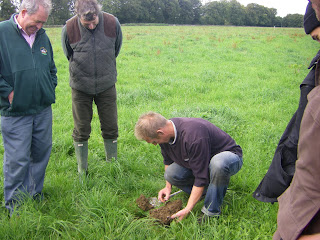A blunt question….Do you think the UK dairy industry is going to benefit from the London Olympics 2012???????????
http://www.london2012.com/
I’m not sure I have a feeling the Games will come & go. We’ll be asking, why didn’t we get our share in the benefits that the London Olympics might have brought to British farmers. If you disagree, where are the dairy products that will be boosted by the world’s top athletes being in the UK in less than 12 months time? We have less than a year to ask the question of our Milk Processors. Lets hope too that our dreary milk cartons get an Olympic make over. Go to most dairy nations in the world & you will find bright modern milk cartons with lots of creative zing!
The only evidence I could find that we are aligning UK dairy farmers with top GB athletes was on the Dairy Council website. http://www.milk.co.uk/default.aspx Actually its not specifically about the London Olympics but it does feature Beth Tweddle & Liam Phillips both GB Olympic athletes.
This is despite MDC funded research work at Loughborough University regarding the possible benefits of low fat chocolate milk to replenish lost body fluids after exercise.
I was flabbergasted once I read the blog on the http://www.dairyuk.org/media-area-mainmenu-270/dgs-blog-mainmenu-343 dated the 19th August 2011….. why it might be that the dairy industry isn’t shouting from podium about the “possible” benefits of milk to athletes……the EU regulators again! To quote directly from the blog….
“The study is really good news for the industry particularly, in the run up to the Olympics. What isn’t such good news is that while our counterparts in the States, Canada and Australia can talk about the study to consumers, in Europe we’re prevented from doing so because there is no approved European health claim for milk and rehydration. Whilst some of the British public might read a few lines on the study in their newspaper, as an industry we can’t openly talk about the results in our consumer communications. For now, we are confined to taking the message to health and fitness professionals. “
One only needs to do a quick search of YouTube to quickly find other countries (read other dairy industries & farmers) not only benefitting from the Loughborough University research (funded by you guys) but also openly quoting it.
http://www.youtube.com/watch?v=Tetruq-XuKI&NR=1
http://www.youtube.com/watch?v=KFBX7xoIAjw
The research has also been printed in the UK press http://www.telegraph.co.uk/health/healthnews/7801188/Chocolate-milk-can-help-athletes-recover.html
http://www.dairyreporter.com/Regulation-Safety/Study-plays-up-skimmed-milk-sports-hydration-boost
A search of “chocolate milk” on the British Journal of Sports Medicine quickly shows the research work that has been completed in the UK http://bjsm.bmj.com/search?fulltext=chocolate+milk&submit=yes&x=10&y=8
This seems to me to be a farcical situation where farmers will be the losers.
Maybe the controversy created by Jamie Oliver in the USA regarding chocolate milk is part of the issue. However his emphasis was really on low fat & low sugar, fresh food & home cooking. No one would argue with less sugar in flavoured milk.
http://www.youtube.com/watch?v=jIwrV5e6fMY
http://www.raiseyourhand4milk.com/
If you do an internet search sport & for colostrum & whey protein you would find similar research data that would suggest the dairy farmers from the UK should have a whole range of new & exciting dairy products ready for the London Olympics. Grass based block calving farms are the only farmers who could supply high quality colostrum in sufficient quantities to meet the demand from athletes.
Other countries don’t seem to have a problem associating milk with sport & a healthy lifestyle. http://www.youtube.com/watch?v=XRcG13Jy2sA
Let’s hope our UK grass based Ice Cream & Cheese makers do well because they have seriously good products that are world class.
I think the London Olympics could be hugely important to British grass based dairy farmers……but what are you going to do about it?
Current UK Pasture Measurements
Extra ordinary growth on the west coast areas that continue to get good rain. Really tough in the Midlands where little rain has fallen. Some farms that have had recent rain now getting bloat. This is a real kick in the guts after struggling for growth earlier.
TheAverage Pasture Cover (kgsDM/ha) & Pasture Growth (kgsDM/ha/day)
Herefordshire, 2114, growth 30, demand 26 slow growth & very dry
South West Wales, 2516, gr 75, de 64, 24mm rain still warm & wet in Pembrokeshire
Pembrokeshire organic, AFC 2150, growth 85, demand 44, never seen such good growth have cut 3rd cut silage for the first time.
‘Boring’ Money Topics That I Find Fun
-
You cannot build strong personal finances without healthy cash flow, and
you won’t know if you have healthy cash flow unless you measure it.
The post ‘B...
55 minutes ago























